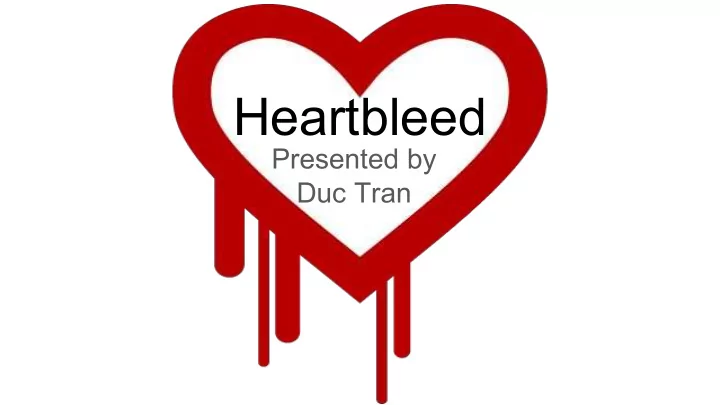

Heartbleed Presented by Duc Tran
Agenda ● Background ○ TLS ○ OpenSSL ○ TLS Heartbeat Extension ● The Hearbleed Bug ● Who’s Vulnerable ● Demo ● Why it’s bad ● Protections
Background ● What is Transport Layer Security (TLS)? ○ Formerly known as Secure Socket Layer (SSL) ○ Cryptographic Protocols for encrypted communication over a network ● Initial Three-Way Handshake
Background ● What is OpenSSL? ○ “OpenSSL is an open source project that provides a robust, commercial-grade, and full- featured toolkit for the Transport Layer Security (TLS) and Secure Sockets Layer (SSL) protocols. It is also a general-purpose cryptography library.” - openssl.org ○ Used for secure connections for: ■ Web ■ Email ■ VPN ■ Messaging Services ■ Certificates ○ Most popular open source cryptographic library and TLS implementation on the internet
Background ● TLS Heartbeat Extension ○ RFC 6520 ○ Provides a protocol for TLS to allow the usage of the Keep-Alive functionality without continuous data transfer ○ Heartbeat Request ■ Payload ■ Payload Length ○ Heartbeat Response ■ Responds with the exact Payload that was sent ● Two Main Purposes: ○ Make sure connection does not close ○ Make sure peers are alive
The Heartbleed Bug (CVE-2014-0160) ● Heartbleed Bug is a flaw in the implemented TLS Heartbeat Extension ○ Not a Vulnerability of TLS/SSL ● Publicly disclosed in April of 2014 ● No Bounds Checking for the Heartbeat messages ○ Allows for Buffer Over-Read ● Allows for stealing information: ○ Session ID ○ Private Keys ○ Passwords ○ Usernames ○ E-mails ○ more…...
OpenSSL Git Logs Original Code --> Checks for Empty Payload --> Makes sure payload length is not too large --> Another check for the Heartbeat message -->
Who’s Vulnerable OpenSSL versions: ● 1.0.1 [14 March 2012] ● 1.0.1a ● 1.0.1b ● 1.0.1c ● 1.0.1d ● 1.0.1e ● 1.0.1f ● 1.0.1g [07 April 2014 - Heartbleed Patch]
Shodan.io Links Shodan is a search engine for Internet Connected Devices We can use it to look for servers using vulnerable versions of OpenSSL ● https://www.shodan.io/search?query=OpenSSL+1.0.1a+port%3A%22443%22 ● https://www.shodan.io/search?query=OpenSSL+1.0.1a+port%3A%228443%22 ● https://www.shodan.io/search?query=OpenSSL+1.0.1b+port%3A%22443%22 ● https://www.shodan.io/search?query=OpenSSL+1.0.1c+port%3A%22443%22 ● https://www.shodan.io/search?query=OpenSSL+1.0.1d+port%3A%22443%22 ● https://www.shodan.io/search?query=OpenSSL+1.0.1e++port%3A%22443%22&page=5 ● https://www.shodan.io/search?query=OpenSSL+1.0.1f+port%3A%22443%22
Demo
Why Heartbleed was bad ● Exposed large amount of private keys, secrets, and critical information ● Attack was relatively easy and left no trace ● Hundred of thousands of servers were vulnerable ● Certificate Renewal and Revocation ○ 30,000 of the 500,000+ possible compromised X.509 certificates by April 11, 2014 ○ 43% by May 9, 2014 …… 7% reissued with potentially compromised private keys ● OpenSSL vulnerable to Heartbleed for a long time ○ March 2012 - April 2014
Protection from Heartbleed Update OpenSSL to version 1.0.1g or greater! If cannot update OpenSSL version, recompile OpenSSL with compile time option:
Questions?
References OpenSSL ● https://openssl.org/ TLS Heartbeat Extension ● https://tools.ietf.org/html/rfc6520 Heartbleed ● http://heartbleed.com/ ● https://git.openssl.org/gitweb/?p=openssl.git;a=commitdiff; h=96db9023b881d7cd9f379b0c154650d6c108e9a3 ● https://jhalderm.com/pub/papers/heartbleed-imc14.pdf ● https://xkcd.com/1354/ Demo ● https://alexandreborgesbrazil.files.wordpress.com/2014/04/hearbleed_attack_version_a_1.pdf ● https://gist.github.com/akenn/10159084
Recommend
More recommend